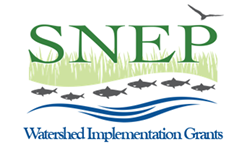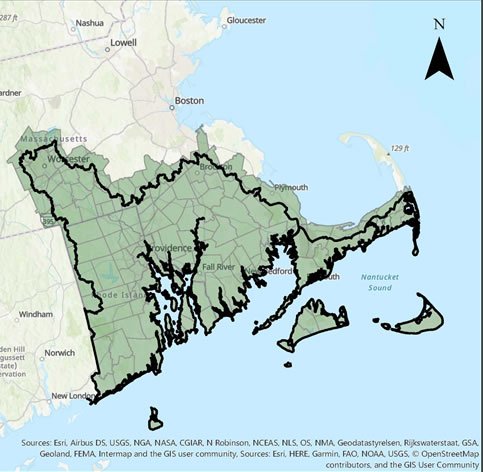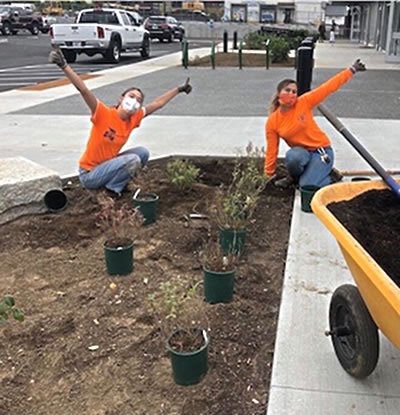SNEP Watershed Implementation Grants (SWIG)

Clean water, healthy watersheds, and vibrant coastal ecosystems are essential to the communities of Southeast New England – the foundation of our region's prosperity and quality of life. Since its inception in 2012, the US Environmental Protection Agency's (EPA's) Southeast New England Program (SNEP) has worked to preserve and restore the region's coastal environment by supporting diverse organizations working on these critical issues.
Grants to local and regional organizations are one important way in which SNEP supports science and action for a better environment. Since 2017, EPA Region 1 in Boston has partnered with Restore America's Estuaries (RAE) to manage SNEP Watershed Grants— now titled SNEP Watershed Implementation Grants (SWIG), an annual grants program that funds local priorities while building regional capacity to address pressing environmental needs.

From 2017-2021, SWIG has awarded more than $10.3 million to build and sustain effective partnerships among public, private, academic and non-profit organizations, including state, federal, municipal and tribal governments. The program utilizes a competitive process to select innovative, high-impact programs and projects for funding.
SWIG supports local solutions and regional learning. SNEP funds partnerships working at the community scale because local knowledge and support often produce the most innovative and lasting results on the ground. Yet by providing grantees with opportunities to share information and resources, SNEP ensures that local accomplishments lead to regional learning and the broader application of SNEP-funded tools and techniques.
Since 2017, SWIG has funded more than 50 local projects and partnerships. Here are just a few examples of the ways in which SNEP Watershed Grants are working to achieve regional priorities for a better environment:
River and Wetland Restoration: Grants are funding the removal of two dams on the Kickemuit River in Warren, RI, to restore coastal saltwater habitat, while grants in Cape Cod are helping to restore abandoned cranberry bogs as habitat for brook trout and other native species.
Environmental Justice: In New Bedford, SNEP Watershed Grants is funding a local partnership that's creating a more resilient environment in the city's North End. The group has developed a community garden and is working on a coastal walking trail; they will be employing local youth to install stormwater infiltration systems and other landscaping improvements at city parks.
Sustainable Economic Development: In Pawtucket, RI, grants are funding a new public park and water quality improvements related to Tidewater Landing, a new soccer stadium and mixed-use development at the head of Narragansett Bay.
Innovative Technology: On Cape Cod and Martha's Vineyard, SWIG is funding research on Permeable Reactive Barriers (PRBs), which reduce nutrient pollution in groundwater before it flows into coastal waters.
Capacity Building: Around Buzzards Bay, SWIG is funding Massachusetts Maritime Academy to develop and implement an academic program that engages students in helping local towns to improve water quality, with educational and environmental benefits.

Policy Innovation: On Pleasant Bay in Cape Cod, SWIG is supporting the first multi-town water quality permit; on Buzzards Bay, the program is funding a study to consider expanding a wastewater treatment plant in Wareham and supporting work to understand water quality management needs for new municipal composting facilities.
Interstate Planning: Because pollution doesn't recognize state boundaries, SWIG is supporting interstate watershed planning efforts, one in Eastern Connecticut and Southwestern Rhode Island, and another on upper Narragansett Bay, in a watershed shared by Rhode Island and Massachusetts.
Monitoring: SWIG is helping to upgrade the buoy network that provides real-time water quality monitoring on Narragansett Bay – improving scientific information for better management decisions.
Southeast New England is fundamentally a coastal place. Our cities and towns – from Newport to Nantucket, Worcester to Westerly, Providence, Fall River, New Bedford, Hyannis and Chatham, are built alongside our harbors, bays and rivers. By funding local projects and partnerships that foster regional solutions, SNEP Watershed Implementation Grants works toward preserving this heritage, in partnership with the communities of the region.
For more about SNEP Watershed Grants, see estuaries.org/snep-watershed-grant/
